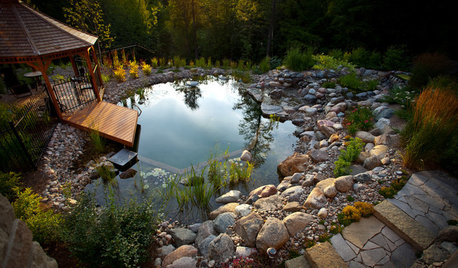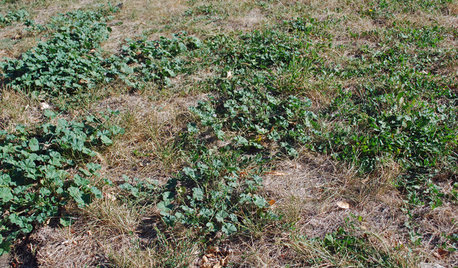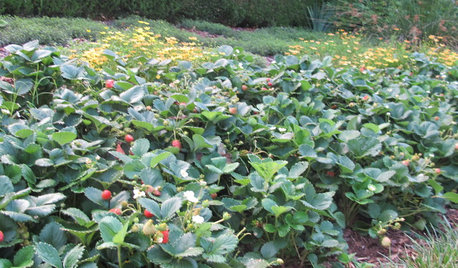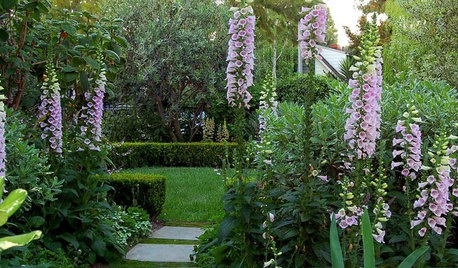Why specifically do organic gardeners avoid chemical fertilizers
gonebananas_gw
11 years ago
Related Stories

GARDENING GUIDESGet on a Composting Kick (Hello, Free Fertilizer!)
Quit shelling out for pricey substitutes that aren’t even as good. Here’s how to give your soil the best while lightening your trash load
Full Story
GARDENING GUIDESHow to Switch to an Organic Landscape Plan
Ditch the chemicals for a naturally beautiful lawn and garden, using living fertilizers and other nontoxic treatments
Full Story
LANDSCAPE DESIGNNatural Swimming Pools: More Beauty, No Chemicals
Keep your skin and the environment healthy with a pool that cleans itself, naturally
Full Story
GARDENING GUIDESWeed War: When and How to Use Chemical Herbicides
Before you spray, arm yourself with knowledge about which weed killers — natural or synthetic — are right for your yard
Full Story
GARDENING GUIDESCommon Myths That May Be Hurting Your Garden
Discover the truth about fertilizer, soil, staking and more to keep your plants healthy and happy
Full Story
GARDENING GUIDESHow to Keep Your Citrus Trees Well Fed and Healthy
Ripe for some citrus fertilizer know-how? This mini guide will help your lemon, orange and grapefruit trees flourish
Full Story
GARDENING GUIDESPacific Northwest Gardener: What to Do in September
Put in cool-weather veggies, fertilize your lawn and tidy the garden this month before chilly weather arrives
Full Story
REGIONAL GARDEN GUIDESSoutheast Gardener's September Checklist
Fertilize strawberries, plant a tree or two and beckon hummingbirds to your Southern garden this month
Full Story
GARDENING GUIDESGreat Design Plant: Knock Out Roses
As glorious as their high-maintenance kin for a fraction of the work, Knock Out roses make even beginners look like garden stars
Full Story
PETSGarden Alert: 22 Plants to Keep Away From Pets
Avoid potential danger by keeping dogs and cats away from these landscaping and houseplant favorites
Full Story







pnbrown
Kimmsr
Related Professionals
Finneytown Landscape Architects & Landscape Designers · Edmond Landscape Contractors · Brandon Landscape Contractors · Canton Landscape Contractors · Dunwoody Landscape Contractors · Euclid Landscape Contractors · Framingham Landscape Contractors · San Pablo Landscape Contractors · Clearfield Landscape Contractors · Bellingham Decks, Patios & Outdoor Enclosures · Bloomington Decks, Patios & Outdoor Enclosures · Cincinnati Decks, Patios & Outdoor Enclosures · Oswego Decks, Patios & Outdoor Enclosures · Richmond Decks, Patios & Outdoor Enclosures · South Houston Decks, Patios & Outdoor Enclosurespnbrown
gonebananas_gwOriginal Author
jolj
pnbrown
TheMasterGardener1
pnbrown
TheMasterGardener1
Lloyd
myluck
nc_crn
TheMasterGardener1
Kimmsr
pnbrown
wayne_5 zone 6a Central Indiana
nc_crn
schizac
wayne_5 zone 6a Central Indiana
nc_crn
pnbrown
nc_crn
wayne_5 zone 6a Central Indiana
elisa_z5
nc_crn
wayne_5 zone 6a Central Indiana
zzackey
pnbrown
novascapes
TheMasterGardener1
Kimmsr
prestons_garden
nc_crn
nc_crn
nc_crn
TheMasterGardener1
prestons_garden
nc_crn
prestons_garden
nc_crn
jolj
nc_crn
prestons_garden
nc_crn
nc_crn
Kimmsr
TheMasterGardener1
nc_crn
fresh-tea
pnbrown